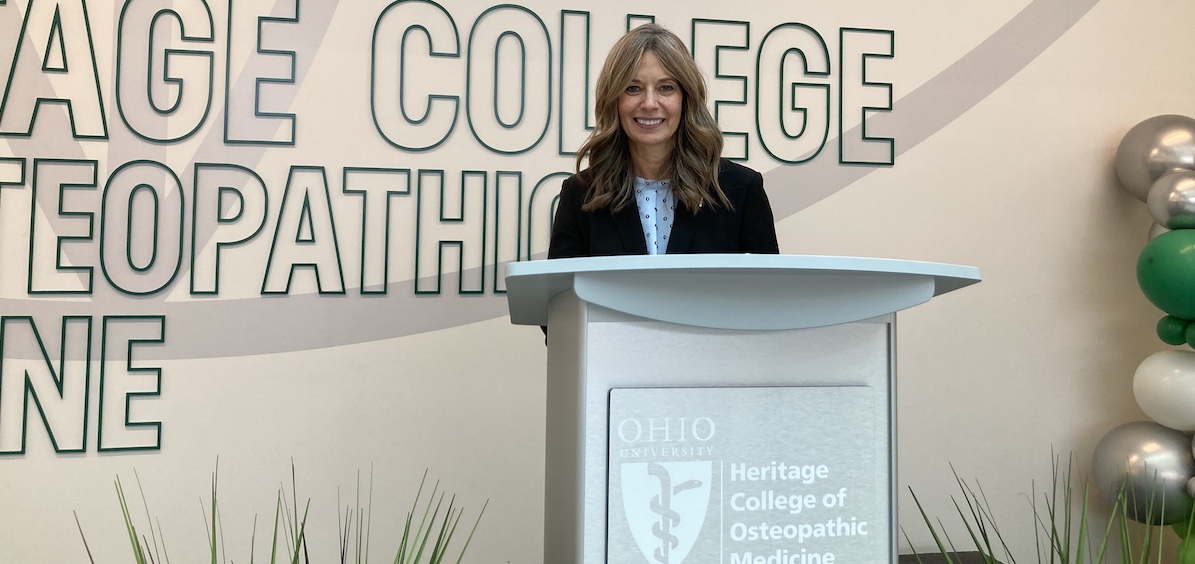Dr. Amy Acton talked to Ohio University students about leadership during the COVID-19 pandemic
By: Gabriel Scotto
Posted on:
ATHENS, Ohio (WOUB) – Dr. Amy Acton, the former director of the Ohio Health Department, talked to medical students at Ohio University about the challenges she faced leading the state’s response to the pandemic and some of the lessons she learned about leadership.
“I’m a very ordinary person, not unlike you in any way, that just ended up in a moment in the crosshairs with history,” Acton said Tuesday during a lecture at the Heritage College of Osteopathic Medicine.
Acton taught at The Ohio State University as an associate professor of public health before being appointed director of the Health Department in February 2019 by Gov. Mike DeWine, becoming the first woman to hold the position.
“I never quite expected to get a call completely out of the blue from the governor,” Acton said.
Her first meeting with DeWine didn’t go as planned.
“I got so excited. I was telling him about what I thought he could do. At one point, I grabbed him by the arm and then people sitting around the table gasped,” Acton said. “I scurried away to the elevator and thought: ‘Oh my goodness, he would never want me in front of a camera.’”
In early 2020, Acton kept a close eye on the situation unfolding in Wuhan and said Ohio began preparing for COVID-19 and conducting drills before the first cases were detected in the United States.
“Once I saw (the Chinese) didn’t have it under control, we started to act,” Acton said.
While natural disasters are confined to a single geographic region and thus resources from across the country can be sent to aid disaster-stricken areas, this would not be possible during a nationwide pandemic.
During the last week of February 2020, Acton visited the White House, where she spoke candidly to then-president Donald Trump’s chief of staff about the threat facing the nation and implored him to utilize the pandemic response plan outlined by the Department of Homeland Security.
“I said to Mick Mulvaney: This is a higher angels moment. This is an FDR, Winston Churchill moment,” Acton said. “We actually invented a playbook for the entire world that will be used in this, and it’s our opportunity to lead the whole world.”

“I learned early on to be an advocate, and as a physician or pharmacist or nurse in healthcare, you really do get the opportunity to share your knowledge and speak up and advocate,” Acton said. “The biggest job is trying to forge some sort of bond, some sort of connection, so you can start to build trust.”
Acton never expected to become something of a celebrity among Ohioans, let alone receive national attention from publications such as the New York Times. Unfortunately, not all the attention she received was positive.
“I had executive protection give me a warning in 2020, before there were people protesting on the dark web,” Acton said. “There were already groups forming, militia groups that were being watched.”
As a result of this activity, Acton was afforded the same level of protection as the governor and lieutenant governor, and officers from the Ohio Highway Patrol were stationed in her driveway around the clock.
Acton said extremists stalked and harassed her children and a group of armed protestors from a militia that would later storm the Capitol on Jan. 6, 2021, showed up at her house. Nevertheless, Acton said such incidents do not represent the attitudes of most Ohioans.
“The majority of Ohioans were rowing together, helping one another get through an unprecedented time,” Acton said. “I have many more stories, letters and artwork that tell the story of what Ohioans did to help one another get through and being part of that was the honor of a lifetime.”
During the pandemic, Acton’s husband read the letters she received to her at night before she went to bed. Acton said she is working with the Ohio History Connection and professors at Ohio University to curate the collection.
Acton said that a 9/11-style postmortem of the pandemic is necessary to provide leadership through the next pandemic, though she acknowledged the current political climate renders this impossible.
“It’s too politically hot on both sides. Eventually, we’ll pause and we’ll start to look back on what we’ve been through,” she said.
Acton concluded by discussing the effect the pandemic had on young people. She said living through the pandemic will influence the development of future leaders and allow them to be more candid about the challenges they face.
“What I see in young people is a lot of compassion and willingness to have hard conversations,” Acton said. “One of the hardest things in leadership is giving people bad news at the rate in which they can accept it.”

